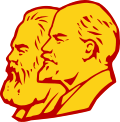| Part of a series on |
| Marxism–Leninism |
|---|
 |
The socialist state of the whole people as a term was introduced by the Communist Party of the Soviet Union (CPSU) as the all-people's state under Nikita Khrushchev's leadership to describe the class system of the Soviet Union. It denoted that the Soviet Union had moved away from the dictatorship of the proletariat to a new state of the whole people since the exploitative classes had been vanquished. The working class (known as the proletariat in Marxist discourse) was no longer to be the ruling class of the state alone, and all social groups were to be given equal representation in the state.[1] This term was redeveloped during Leonid Brezhnev's leadership of the CPSU as the state of the whole people, and added into the 1977 Soviet Constitution.[2] The state of the whole people is, according to Soviet ideologue Aleksei Rumyantsev, the class system of developed socialism.[3]
Criticism
[edit]Not everyone greeted this concept positively. The idea that the dictatorship of the proletariat had ceased to exist before the withering away of the state proved controversial since it broke with the Marxist conception of a ruling class—the state only exists as a tool for class domination.[4] The theoretical newspaper of the Central Committee of the Chinese Communist Party (CCP) deemed Khrushchev to be a revisionist: "a more dangerous enemy of Communist unity than rebels such as [Josep Broz] Tito of Yugoslavia and Leon Trotsky".[5] The CCP still holds this position, and Wang Weiguang, President of the Chinese Academy of Social Sciences from 2013 to 2018 and member of the 18th CCP Central Committee, states, "Since the state is a product of class struggle, the state cannot be supra-historical, supra-class, and all-people, but has to have a class basis."[6]
References
[edit]Books
[edit]- Hill, Ronald J. (1984). "Chapter 3: The 'All-People's State' and 'Developed Socialism'". In Harding, Neil (ed.). The State in Socialist Society. State University of New York Press. pp. 104–128. ISBN 9780873958387.
- Kim, Sung Chull (2012). North Korea Under Kim Jong Il: From Consolidation to Systemic Dissonance. State University of New York Press.
- Rumyantsev, Aleksei Matveyevich (1984). A Dictionary of Scientific Socialism. Progress Publishers.
- Sandle, Mark (2005). A Short History of Soviet Socialism. University College London Press. ISBN 0-203-55919-3.
Journals
[edit]- Kanet, Roger E. (1968). "The Rise and Fall of the 'All-People's State': Recent Changes in the Soviet Theory of the State". Soviet Studies. 20 (1): 81–93. JSTOR 149275.
- Vishniak, Mark (1964). "Khrushchëv's 'All-People's State'". Communist Affairs. 2 (2): 3–7. JSTOR 45368047.
News articles
[edit]- Wang Weiguang (25 September 2014). "坚持人民民主专政,并不输理" [Upholding the People's Democratic Dictatorship Is Not Unreasonable]. People's Daily (in Chinese). Archived from the original on 12 February 2022. Retrieved 24 January 2024.
Footnotes
[edit]- ^ Kim 2012, p. 116; Sandle 2005, p. 243.
- ^ Hill 1984, p. 110.
- ^ Rumyantsev 1984, p. 253.
- ^ Kanet 1968, pp. 81 & 83.
- ^ Vishniak 1964, p. 3.
- ^ Wang 2014.